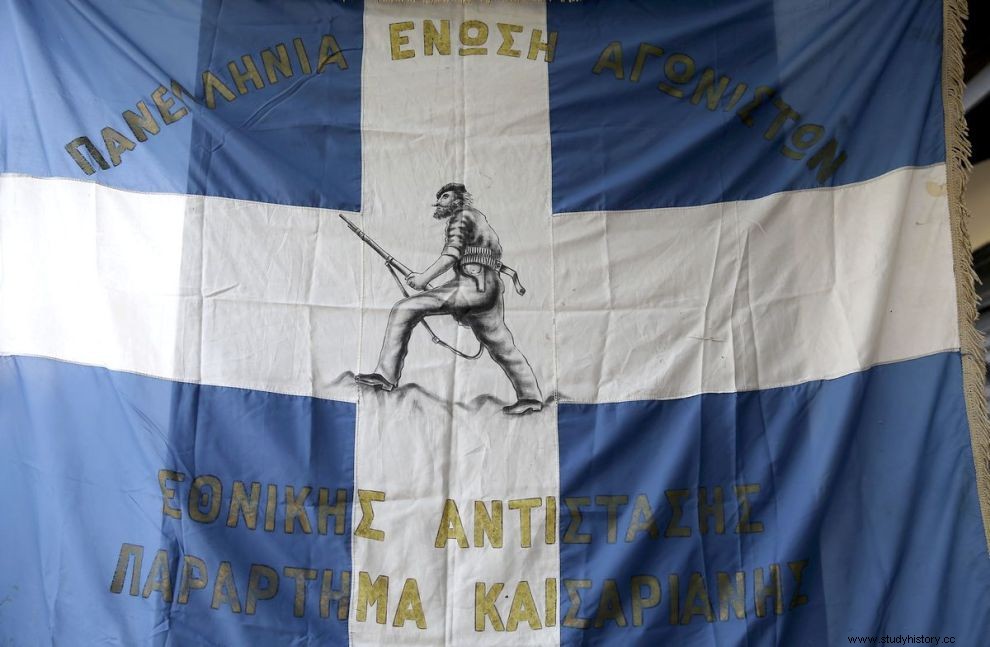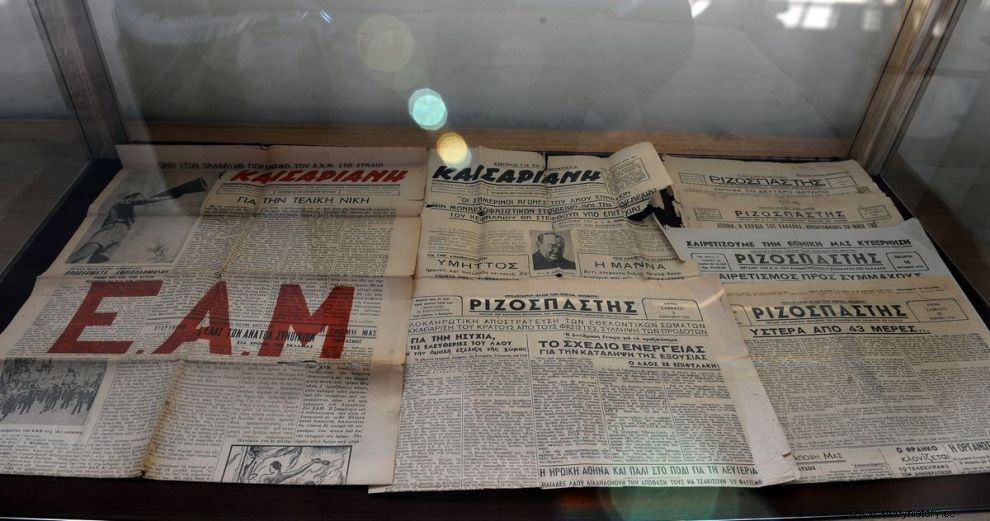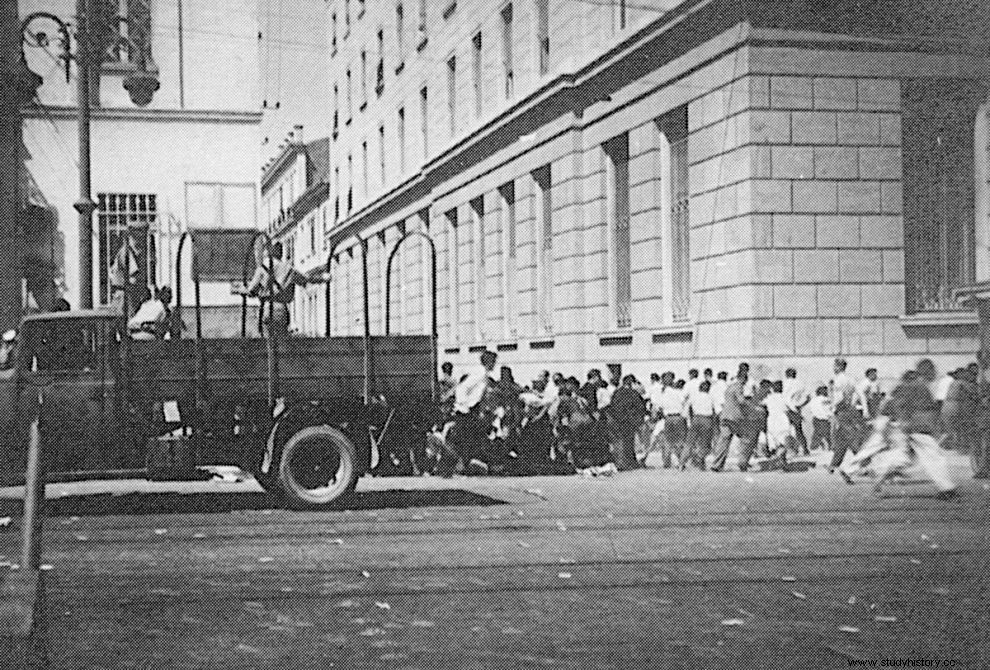September 27th does not hold the place it should have in the national collective memory. In fact, few remember what happened then 80 years ago. And yet, the establishment of the National Liberation Front, EAM, constitutes a pivotal moment in the modern history of the country. The EAM, a Front formed by political bodies not particularly popular in pre-war Greece, managed to develop into by far the most massive resistance organization in the Occupation, to mobilize the masses, to achieve great political and also military (with ELAS) victories and to write history in golden letters.
Among other things, the EAM giantized what we characterize as the Greek left. Despite the persecutions, the tortures and the attempt to write history differently, especially from the Civil War onwards, the Left drew from the EAM legitimacy, a moral advantage and a value system which gave a powerful present to post-war Greece and shaped, to a large extent, , developments (but also left-wing consciences).
With the historian Menelaos Charalambidis, who has devoted most of his scientific research to the period of the Occupation, we discussed all of the above while we wandered through the streets of the center of Athens identifying points that were connected to the action of the EAM in the capital during the particularly difficult period of the Occupation. You will see the result of this wandering in a 16-minute video which is included in the text.
How can the great success of EAM be explained, even though it was politically supported by parties with little appeal in the pre-war scene?
The electoral influence of the parties that founded the EAM may have been small, but during the dense time of the Occupation, the EAM managed to politically express a large part of Greek society, functioning simultaneously as a resistance organization and as a political body. The EAM gave political/ideological content to the struggle of the Greek people to face the nightmarish consequences of the Occupation. Consequences that not only affected the poor popular strata, but economically flattened a large part of the middle and part of the upper class.
The transformation of the individual struggle for survival into a collective resistance struggle, the use of the act of resistance as a factor in the formation of a new political identity, the trust he showed in politically marginalized social groups (women, youth, Asia Minor refugees), his persistence and success in the creation of a broad social (workers, public and private employees, students, artisans, freelancers, etc.) and political (communists, socialists, Venizelians) alliance, were some of the reasons for the success of the Eamian project. The enormous work of the EAM dramatically increased the political influence of the parties that founded it. During the years of the Occupation, the number of members in the KKE exceeds any previous one and at the same time it transforms into a multi-collective party.

What is the role of the KKE in its establishment and in the first months of its course and how were broad masses convinced to cooperate with an organization that supported the illegal before the war, KKE?
The role of the KKE was leading not only in the foundation, but throughout the existence of the EAM. Despite the fact that the war found the KKE organizations crushed by the dictatorial regime of Ioannis Metaxas, the communists managed very quickly to overcome the hafiedophobia, any disagreements between them and to find a common step in the creation of the EAM. They demonstrated particular political maturity and organizational ingenuity, adopting practices that allowed the greatest possible expansion of the EAM, accepting to cooperate with their pre-war political opponents.
The successful resistance and political action of the EAM led very quickly to the collapse of the pre-war anti-communist "crusade" of the governments of Venizelos, Tsaldaris and especially the dictatorship of King Metaxas. The propaganda that presented the communists as criminals and enemies of the country was effectively nullified through the patriotic struggle and the unprecedented network of solidarity that the hemist organizations created in neighborhoods, workplaces and education.
Why did the rest of the resistance organizations, despite their action, not reach such massive points in their ranks?
In my opinion there were two main reasons. The rest of the resistance organizations did not have the know-how of the communists in organizing the illegal struggle. Their pre-war action was always legal. Only the KKE was outside the law and had to develop mechanisms and practices of action in deep illegality. Organizationally, therefore, the communists were ready. This combined with their political maturity, which I mentioned earlier, gave EAM a great comparative advantage. The second reason concerns the political goal of the resistance organizations.
The EAM aimed to prevent the return to power of the political system that allowed the fascist forces of Ioannis Metaxas to occupy it and at the same time did not recognize the status of a legitimate political force in the KKE. Therefore, EAM from the beginning based its political aspirations on its massiveness. This massiveness could ensure its legitimacy in the political system. The rest of the resistance organizations did not speak of an overthrow, but of a reform of the pre-war political system.
They came from "legitimated" political forces and used more clientelistic rather than cinematic methods of mobilizing their supporters, as the latter were unknown to them. Through the EAM, the KKE built a resistance/political movement. The remaining political forces formed resistance organizations, with an important task, but also with an end date of the end of the war.
What is the imprint of EAM in the post-war years and in the general presence of the Greek left after the war?
The EAM essentially legitimized the presence of the Left in the central political scene. Before EAM, the Left was a marginalized and illegitimate political force. After the EAM, the Left consolidated its position in Greek society and in the political scene. For example, it would have been extremely difficult for the EDA to win the position of official opposition in the 1958 elections, just eight years after the end of the civil war in a regime of harsh persecution, if the EAM had not preceded it. Also, the EAM offered basic "building materials" for the construction of the narrative of the Left.
The Resistance and its thousands of victims, the imprint of all of them in literature, music, visual arts, cinema, continue to leave their political imprint 80 years later. It is difficult to find any important creator of the 20th century whose work does not have a reference to the years of resistance. Also, the EAM highlighted the patriotic character of the Left, in contrast to the anti-national character attributed to it by the winners of the Civil War. Fighting through the EAM, the communists died not only for the party, but mainly for the country.

Why was it characteristically late for the EAM's contribution to the resistance struggle to be officially recognized?
The Civil War may have ended in August 1949, but its consequences were active at least until the fall of the Junta in 1974. Although the KKE was legalized by the government of Kon/nos Karamanlis in 1974, the recognition of the EAM took place eight years later, by the first PASOK government with the bill on the recognition of the National Resistance. The reasons were of course political and related to the tactic of political, social and economic exclusion with which the winners faced the losers of the Civil War.
The EAM constituted the matrix from which the entire Left derived its prestige. His struggles gave the Left its famous moral edge. Therefore it was very difficult for her political opponents, who were in power all these years and many of them fought in the Occupation, the Decembers and the Civil War against her, to recognize her contribution to the resistance struggle. EAM was a "forbidden" word until 1974, due to the fact that it was a creation of the KKE and other leftist forces and at the same time the largest Greek resistance organization. After all, for some the EAM is still synonymous today with communist rebellion and betrayal.
What were the actions that gave EAM the high prestige it enjoyed over the months and years?
There are too many to list here. Very briefly:
The liberation of a significant part of the country by ELAS, the creation of Free Greece in the mountainous mainland and the establishment of structures of a differently organized state (local self-government, justice, welfare, etc.) by the Political Committee for National Liberation or "Mountain Government ».
The EAM's fight for the solution of the food problem with the "harvest battle" in the countryside and the strikes and demonstrations in the cities with the aim of the fair distribution of the humanitarian aid that arrived in the country with the ships of the International Red Cross.
The huge victory against the conscription measure, which threatened tens of thousands of Greek families with forced laborers to Germany. The mobilizations, organized mainly by EAM, resulted in the withdrawal of the measure, which made Greece the only occupied European country in which political conscription was not implemented.

The enormous task and the importance of psychological support for the conquered. One of the greatest contributions of the resistance movement, and of course the EAM, was that in the gloomy everyday life of the Occupation, resistance action was the only hope. In all occupied countries the Resistance functioned as a safety net for the testing society. Initially, it stopped the free fall of citizens into increasingly individualistic survival logics, involvement in illegality, cooperation networks with the conquerors, etc. He then organized the counterattack by offering society ways of resistance against the conquerors and their local collaborators. The work of the Resistance was enormous and unfortunately we know so little about it.
